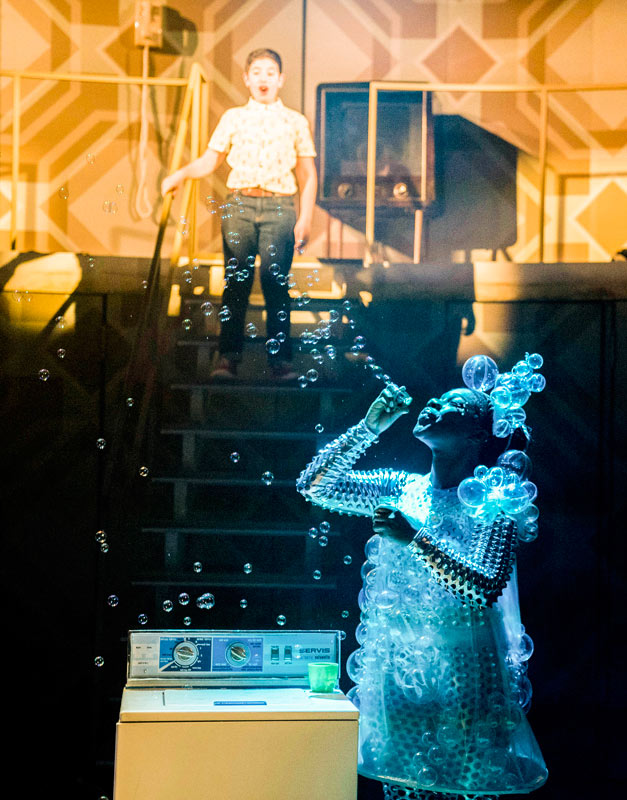[yasr_overall_rating size=”large”]
Carolina, or Change was first seen on Broadway in 2003 and then awarded an Olivier Award in 2007.
In England, the play was staged at the Chichester Festival Theater last year and then at the Hampstead Theater in March 2018 and was critically acclaimed!
Carolina, or Change just made his transfer to the West End at the Playhouse Theater.

The story
Louisiana, 1963. Caroline, the poorly paid African-American maid from the Gellman Jewish family home, works tirelessly in their stuffy basement. The household appliances that surround her work come to life: the washer, dryer and radio sing and comment on Caroline's situation. The basement is a fantastic place for 8-year-old Noah Gellman who spends as much time there as he can to see Caroline.
Noah leaves his change (in English: "change") in his pockets which Caroline finds and leaves in a bowl above the machine. Noah's mother-in-law, Rose, is unable to give Caroline a raise, and tells her that she can keep the money Noah leaves in her pockets. Caroline is reluctant and refuses to take money from a child, but Caroline, divorced and mother of 4 children, knows that she needs this money for her family.
At the same time in the United States, we learn of the assassination of JFK and the social progress observed in the country is starting up.
Our opinion
An important element is the subtle partition which mixes styles: jazz, Jewish music, Motown. This really enhances the voice of the actors who are sublime and powerful but also highlights the different lives of the characters between the father playing Jewish melodies on the clarinet, the mother singing patter songs and Caroline singing poignant jazz melodies .
A positive point of these melodies which are linked is that the public does not have much opportunity to applaud and that these applause take on new importance. But all the same, the music is so linked that the melodies are hard to remember and mix.
Tony Kushner's libretto and lyrics are quite poetic, funny, and politically savage, although some of the story's details are rehashed a bit. Some moments are poignant, especially Lot's Wife, sung by Caroline: a heartbreaking monologue about what she has become.
At the heart of the piece is the extraordinary performance of Sharon D. Clarke. Each note and movement encapsulates who Caroline is: the calm she brings to this role reflects the sadness and anger of what this character feels. Her voice is powerful and ranges from delicate melodies reminding her of her husband to loud cries of pain over his situation.
She is surrounded by an incredible team, each more talented than the last. The three performers of the Radio are impressive vocally and we also highlight the performances of Lauren Ward who plays Rose, Naana Agyei-Ampadu who plays Dotty, Abiona Omonua who plays Emmy, Caroline's eldest daughter. Aaron Gelkoff, who played Noah the night I saw him, brings a lot of color to this character; we almost forget that it is only a child.
Michael Longhurst's staging is very strong and very imaginative. There is a real play between certain scenes seen by the eyes of a child (here, Noah) and seen by Caroline. This gives rhythm and color to the musical.

The decorations are particularly effective, they capture the atmosphere of the American house of 1963. The scenography is also ingenious, using a turntable (which unfortunately creaks a little), a decor that separates in two and a large glass seat which floats above the stage to welcome the actress who plays the moon, dressed in silver.
The costumes are very imaginative: each actor interpreting an object in a stylized and creative costume (for example, the interpreter of the washing machine has a dress with bubbles in relief). They also reflect the style of the 60s in the United States.
The artistic and creative team
Tony Kushner, author of the legendary play Angels in America, signs the booklet and the lyrics; Jeanine Tesori presents an exceptional score, entirely sung.
For this production, Michael Longhurst is directing the production. In March 2019, he will become the artistic director of Donmar Warehouse in London.
Fly Davis is responsible for the scenography and the sets, the choreography is signed Ann Yee, the musical direction of Nigel Lilly, lights by Jack Knowles and sounds by Paul Arditti.
Don't hesitate to reserve your places! It's this way!
